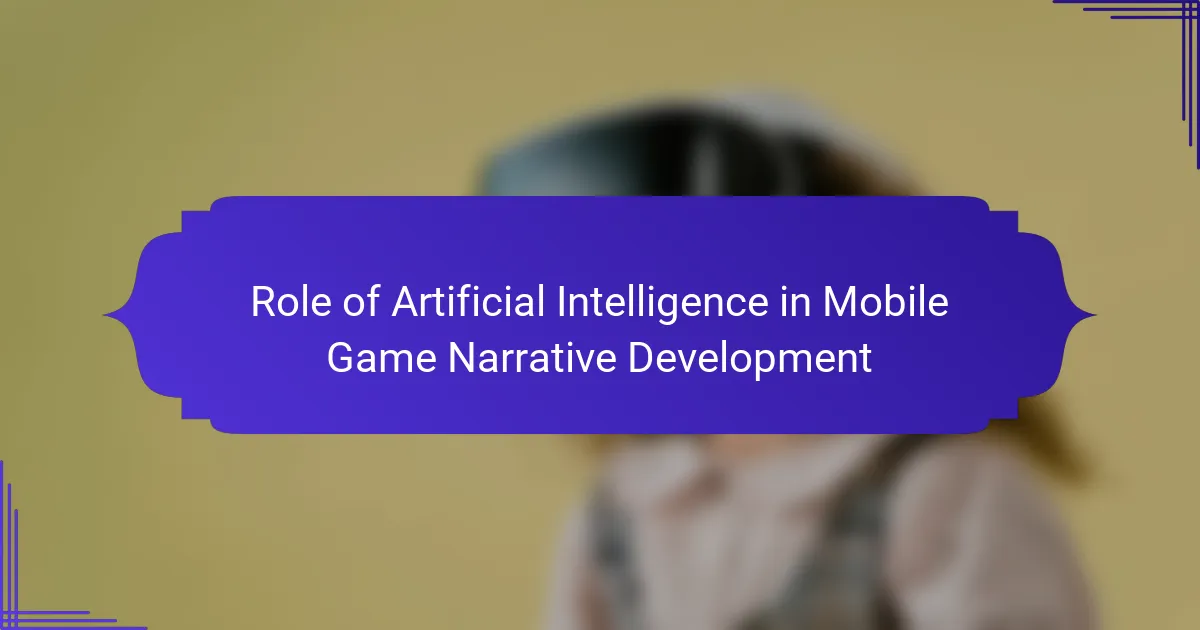Artificial Intelligence is transforming mobile game narratives by enabling dynamic storytelling that adapts to player choices. This article explores how AI enhances engagement through personalized storylines, highlights innovative examples like “AI Dungeon” and “Reigns,” and discusses emerging trends such as procedural content generation and dynamic character interactions. Additionally, it addresses the challenges developers face in balancing creativity with algorithmic constraints.
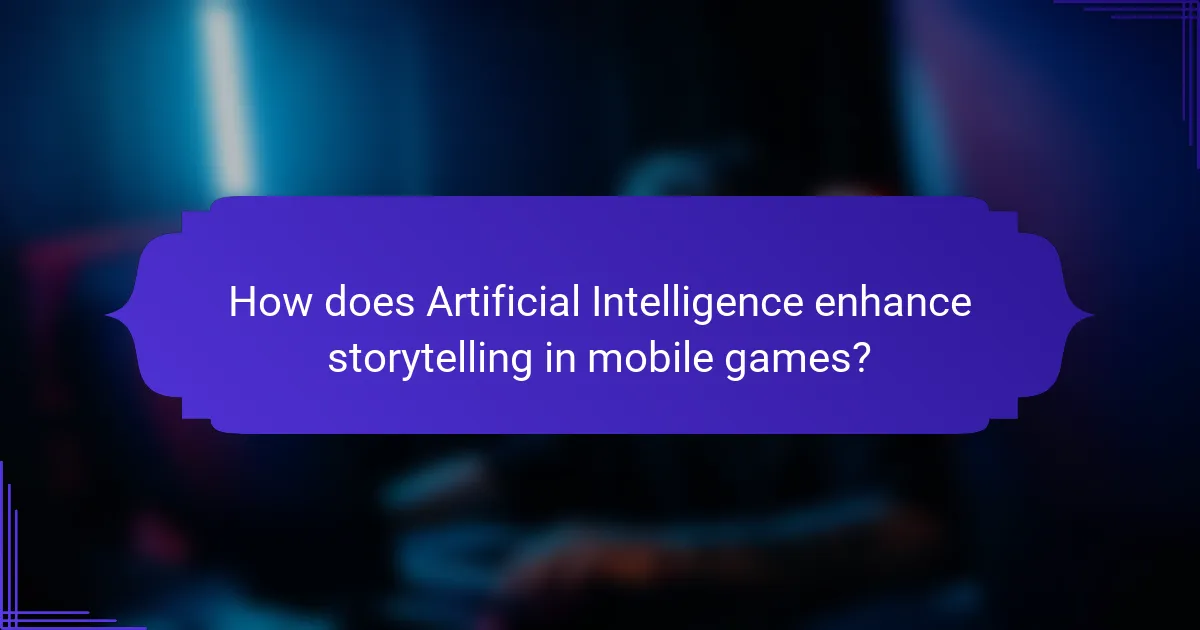
How does Artificial Intelligence enhance storytelling in mobile games?
Artificial Intelligence significantly enhances storytelling in mobile games by creating dynamic narratives that adapt to player choices. AI algorithms analyze player behaviour, enabling personalized storylines that maintain engagement. These systems can generate unique dialogue and scenarios, ensuring each player’s experience feels distinct. Additionally, AI-driven character development allows for more realistic interactions, deepening emotional connections. As a result, players become more immersed in the game world, enhancing overall enjoyment and replayability.
What are the key techniques used in AI-driven narrative development?
AI-driven narrative development in mobile games utilizes techniques like procedural content generation, adaptive storytelling, and player behaviour analysis. These methods enhance player engagement and create personalized experiences.
Procedural content generation allows for dynamic story elements based on algorithms, ensuring unique narratives for each playthrough. Adaptive storytelling adjusts the plot based on player choices, making the experience more immersive. Player behaviour analysis gathers data on decisions and preferences, enabling developers to refine narratives that resonate with audiences.
These techniques leverage AI’s capabilities to create rich, engaging stories that evolve with player interactions, resulting in a more interactive gaming experience.
Which AI algorithms are most effective for character development?
Machine learning algorithms, particularly neural networks and reinforcement learning, are most effective for character development in mobile games. These algorithms enable dynamic storytelling and adaptive character behaviour. Neural networks analyze player interactions to create personalized character arcs, while reinforcement learning helps characters evolve based on player choices. This approach enhances player engagement and narrative depth.
How does AI impact player engagement through narrative?
AI enhances player engagement in mobile games by creating dynamic narratives that adapt to individual player choices. This personalization fosters deeper emotional connections, making players feel more invested in the story. AI algorithms analyze player behaviour and preferences, allowing for tailored story arcs that respond to decisions, enhancing immersion. Unique narrative paths can emerge based on player interactions, ensuring a fresh experience with each gameplay. As a result, the role of AI in narrative development not only enriches storytelling but also significantly boosts player retention and satisfaction.
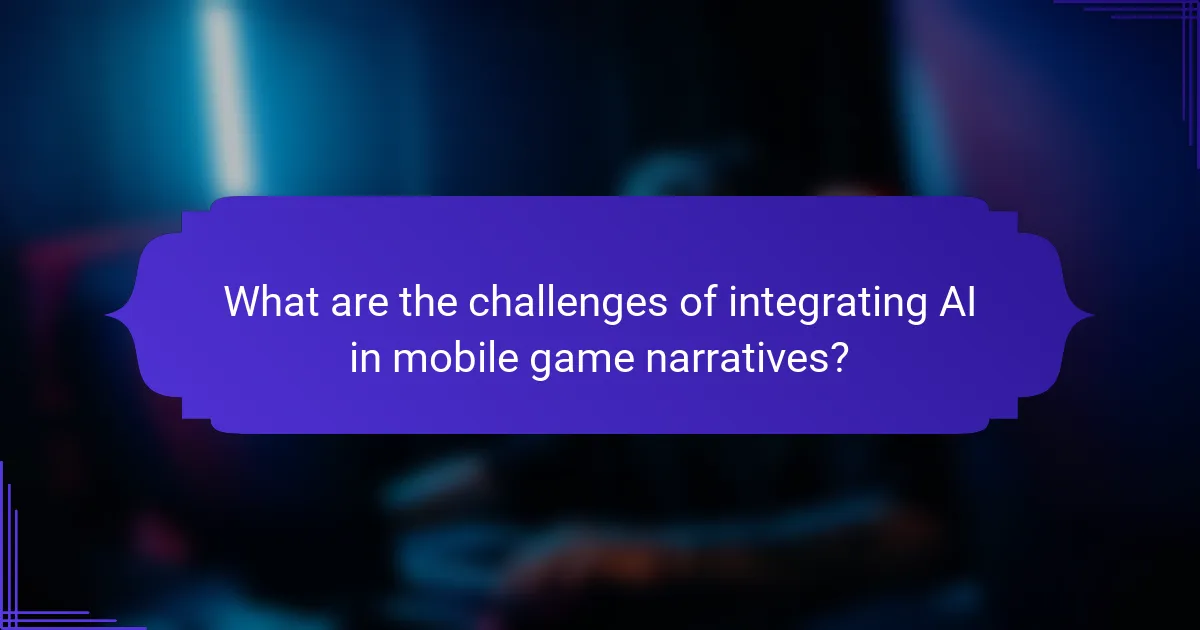
What are the challenges of integrating AI in mobile game narratives?
Integrating AI in mobile game narratives presents challenges such as balancing creativity with algorithmic constraints and ensuring player engagement. Developers must navigate the complexity of creating dynamic storylines that adapt to player choices while maintaining narrative coherence. Additionally, the unpredictability of AI-generated content can lead to inconsistencies, hindering the overall gaming experience. Ensuring that AI enhances rather than detracts from storytelling is crucial for successful integration.
How do developers address ethical concerns with AI narratives?
Developers address ethical concerns with AI narratives by implementing guidelines and best practices. They prioritize transparency, ensuring players understand AI decision-making processes.
Additionally, they incorporate diverse perspectives to avoid bias in narratives. Regular assessments of AI-generated content help identify and mitigate potential ethical issues. Engaging with players for feedback fosters a sense of community and accountability. These practices collectively enhance the integrity of mobile game narratives.
What technical limitations exist in current AI narrative systems?
Current AI narrative systems face several technical limitations. These include a lack of deep contextual understanding, which hinders their ability to create coherent and engaging storylines. Additionally, they struggle with emotional nuance, making it difficult to convey complex character development. Another limitation is the reliance on predefined templates, which can lead to repetitive and predictable narratives. Finally, real-time adaptability is often limited, restricting the system’s ability to respond dynamically to player choices.
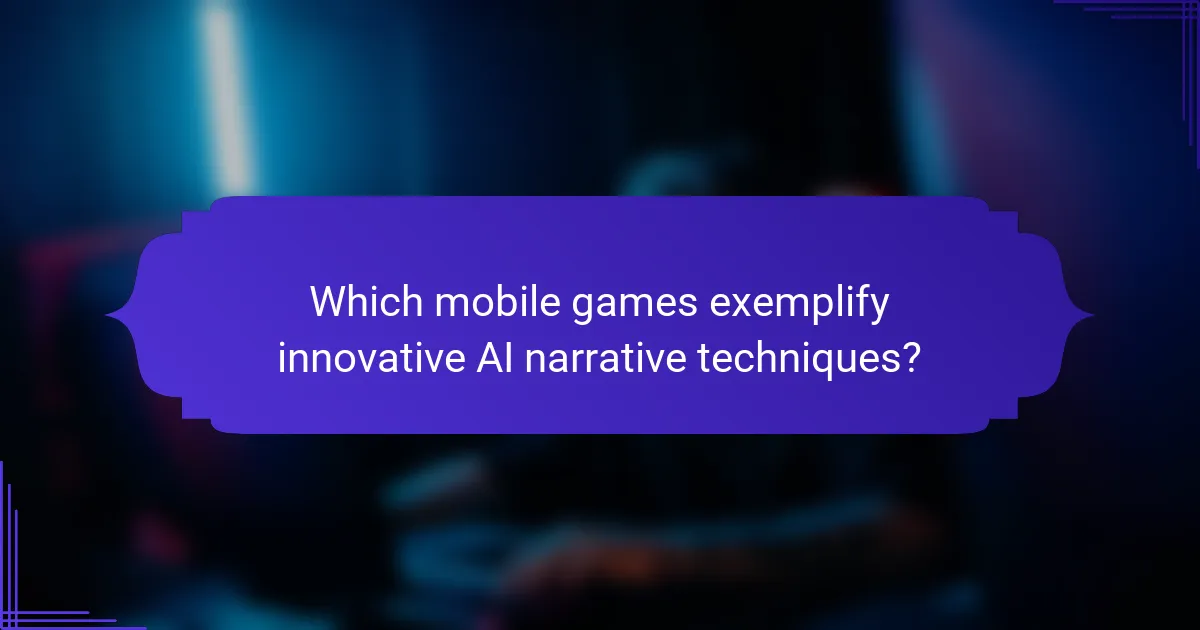
Which mobile games exemplify innovative AI narrative techniques?
Mobile games like “AI Dungeon,” “Reigns,” and “Event[0]” showcase innovative AI narrative techniques. These games leverage AI to create dynamic storylines that adapt to player choices, enhancing engagement and replayability.
“AI Dungeon” uses natural language processing to generate unique narratives based on player input, allowing for limitless storytelling possibilities. “Reigns” employs a card-based decision-making system where players’ choices shape the kingdom’s fate, demonstrating how AI can influence narrative direction. “Event[0]” features an AI character that responds to player interactions, creating a personalized and immersive experience.
These examples illustrate how AI can revolutionise mobile game narratives by fostering interactivity and personalization.
What unique features do these games offer to players?
Artificial intelligence enhances mobile game narratives by offering personalized experiences, dynamic storytelling, and adaptive character interactions. These features create immersive environments that respond to player choices in real-time, leading to unique gameplay experiences. AI-driven algorithms analyse player behaviour, allowing for tailored content that keeps players engaged. This adaptability can also extend to difficulty levels, ensuring challenges remain appropriate for individual skill sets.
How do cultural contexts influence AI narrative choices in these games?
Cultural contexts significantly shape AI narrative choices in mobile games by influencing character development, plot structures, and thematic elements. For instance, cultural norms dictate what is considered relatable or engaging, impacting player immersion. AI can analyse local customs and preferences to tailor narratives that resonate with diverse audiences. This adaptability enhances player experience and encourages emotional connections to the game. Additionally, cultural references embedded in narratives can enrich storytelling, making it more relevant and engaging for players from different backgrounds.
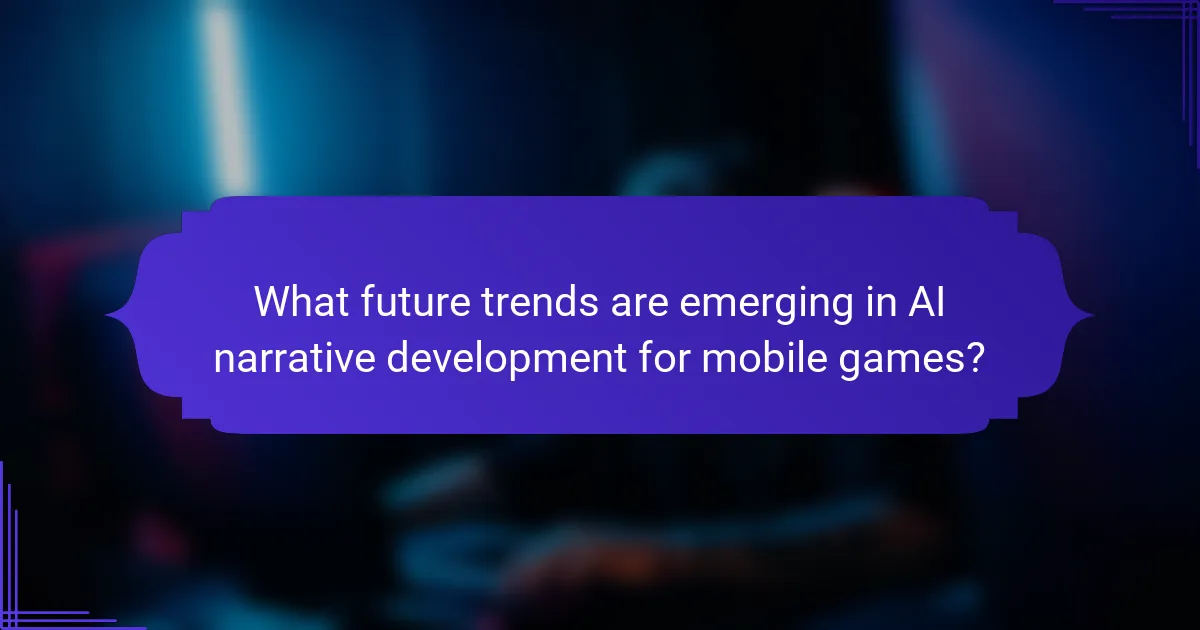
What future trends are emerging in AI narrative development for mobile games?
Emerging trends in AI narrative development for mobile games focus on personalized storytelling, procedural content generation, and dynamic character interactions. These advancements enhance player engagement and create unique experiences. Personalized storytelling tailors narratives based on player choices, while procedural content generation ensures diverse storylines. Dynamic character interactions respond to player actions, making the game world feel alive. These trends leverage AI’s capabilities to adapt narratives, fostering deeper emotional connections and replayability.
How will advancements in AI technology shape storytelling in gaming?
Advancements in AI technology will significantly enhance storytelling in gaming by enabling dynamic narratives. AI allows for personalized player experiences, adapting storylines based on individual choices. This leads to more immersive gameplay, where characters react uniquely to player actions, creating a unique attribute of narrative depth. Moreover, AI can generate complex dialogue and branching story paths, increasing replayability. As a result, players engage in richer, more meaningful interactions within the game world, transforming traditional storytelling methods.
What role will player feedback play in evolving AI narratives?
Player feedback is essential for refining AI narratives in mobile games. It shapes character development, plot progression, and player engagement. By analysing feedback, developers can identify which story elements resonate or frustrate players, leading to more immersive experiences. This iterative process enhances narrative depth and aligns with player expectations, ultimately improving satisfaction and retention.
What best practices should developers follow for effective AI narrative integration?
Developers should prioritise user engagement, narrative coherence, and character depth for effective AI narrative integration. Utilizing AI tools can enhance storytelling by creating dynamic characters that adapt to player choices. Focus on integrating AI-driven dialogue systems to provide personalized interactions, enhancing overall immersion. Testing and iteration are crucial; collect player feedback to refine narrative elements continuously. Lastly, ensure AI complements the narrative rather than detracts from it, maintaining a balance between automation and creative storytelling.
